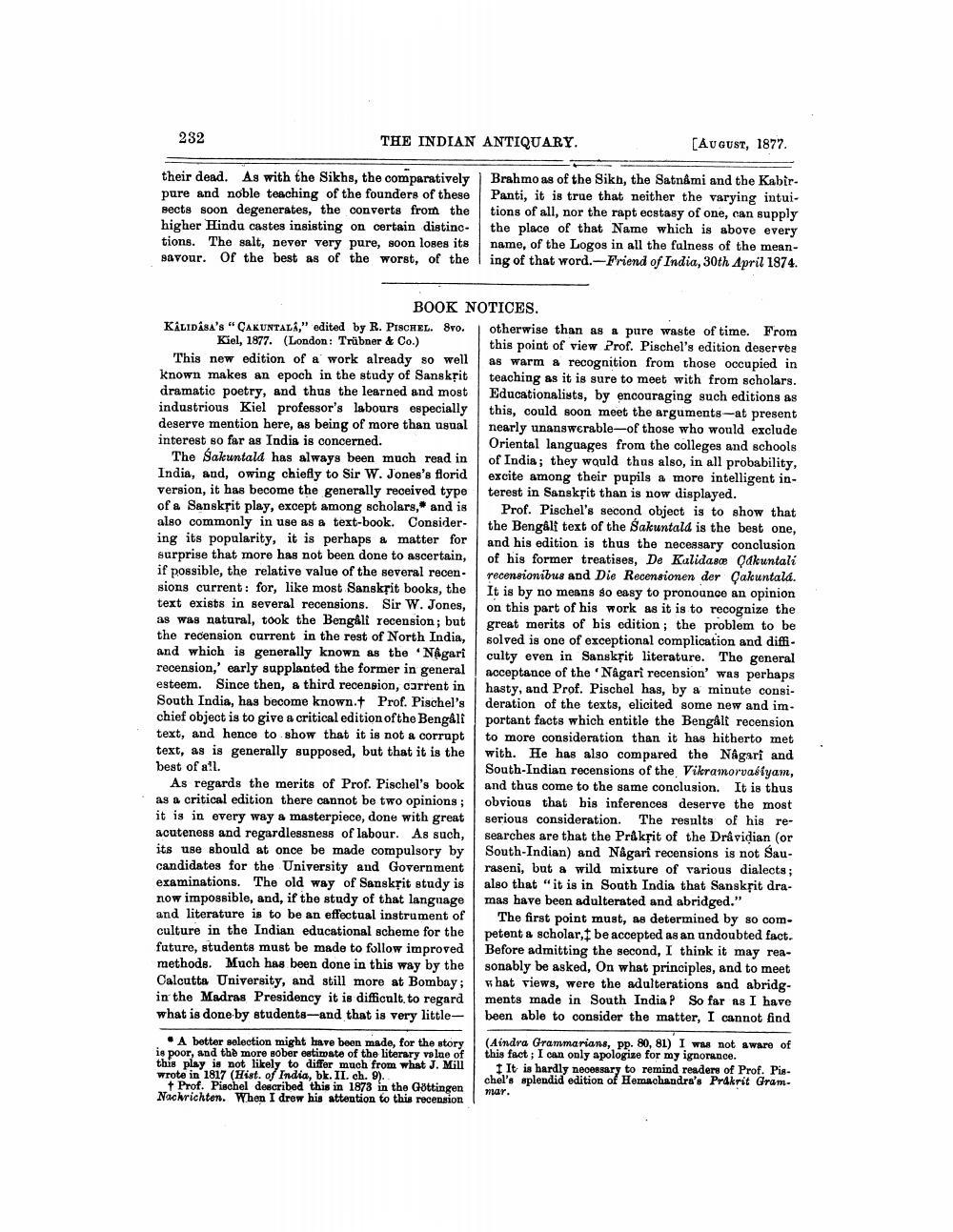________________
232
THE INDIAN ANTIQUARY.
[AUGUST, 1877
their dead. As with the Sikhs, the comparatively | Brahmo as of the Sikh, the Satnâmi and the Kabir. pure and noble teaching of the founders of these Panti, it is true that neither the varying intuiBects soon degenerates, the converts from the tions of all, nor the rapt ecstasy of one, can supply higher Hindu castes insisting on certain distinc- the place of that Name which is above every tions. The salt, never very pure, soon loses its name, of the Logos in all the fulness of the meansavour. Of the best as of the worst, of the ling of that word.-Friend of India, 30th April 1874.
BOOK NOTICES. KALIDASA's "CAKUNTALA," edited by R. PISCHEL. 8vo. otherwise than as a pure waste of time. From Kiel, 1877. (London: Trübner & Co.)
this point of view Prof. Pischel's edition deserves This new edition of a work already so well as warm & recognition from those occupied in known makes an epoch in the study of Sanskrit teaching as it is sure to meet with from scholars. dramatic poetry, and thus the learned and most Educationalists, by encouraging such editions as industrious Kiel professor's labours especially this, could soon meet the arguments-at present deserve mention here, as being of more than usual nearly unanswerable-of those who would exclude interest so far as India is concerned.
Oriental languages from the colleges and schools The Sakuntald has always been much read in of India; they would thus also, in all probability, India, and, owing chiefly to Sir W. Jones's florid excite among their pupils a more intelligent inversion, it has become the generally received type terest in Sanskrit than is now displayed. of a Sanskrit play, except among scholars, and is Prof. Pischel's second object is to show that also commonly in use as a text-book. Consider the Bengali text of the Sakuntald is the best one, ing its popularity, it is perhaps a matter for and his edition is thus the necessary conclusion surprise that more has not been done to ascertain, of his former treatises, De Kalidase Cakuntali if possible, the relative value of the several recen. recensionibus and Die Recensionen der Cakuntala. sions current: for, like most Sansksit books, the It is by no means so easy to pronounce an opinion text exists in several recensions. Sir W. Jones, on this part of his work as it is to recognize the as was natural, took the Bengali recension; but great morits of his edition; the problem to be the recension current in the rest of North India, solved is one of exceptional complication and diffiand which is generally known as the Nagari culty even in Sanskrit literature. The general recension,' early supplanted the former in general acceptance of the Nagari recension' was perhaps esteem. Since then, a third recension, carrent in hasty, and Prof. Pischel has, by a minute consiSouth India, has become known. Prof. Pischel's deration of the texts, elicited some new and im. chief object is to give a critical edition of the Bengali portant facts which entitle the Bengált recension text, and hence to show that it is not a corrupt to more consideration than it has hitherto met text, as is generally supposed, but that it is the with. He has also compared the Nâgari and best of al.
South-Indian recensions of the Vikramorvasiyam, As regards the merits of Prof. Pischel's book and thus come to the same conclusion. It is thus as a critical edition there cannot be two opinions ; obvious that bis inferences deserve the most it is in every way a masterpiece, done with great serious consideration. The results of his reacuteness and regardlessness of labour. As such, searches are that the Prakṣit of the Dravidian (or its use should at once be made compulsory by South-Indian) and Nagari recensions is not Sau. candidates for the University and Government raseni, but a wild mixture of various dialects; examinations. The old way of Sansksit study is also that "it is in South India that Sanskrit dranow impossible, and, if the study of that languagemas have been adulterated and abridged." and literature is to be an effectual instrument of The first point must, as determined by so comculture in the Indian educational scheme for the petenta scholar, I be accepted as an undoubted fact. future, students must be made to follow improved Before admitting the second, I think it may reamethods. Much has been done in this way by the sonably be asked, On what principles, and to meet Calcutta University, and still more at Bombay: what views, were the adulterations and abridgin the Madras Presidency it is difficult to regard ments made in South India ? So far as I have what is done by students--and that is very little- been able to consider the matter, I cannot find
A better selection might have been made, for the story is poor, and the more sober estimate of the literary value of this play is not likely to differ much from whist J. Mill wrote in 1817 (Hist. of India, bk. II. ch. 9).
+ Prof. Pischel described this in 1878 in the Göttingen Nachrichten. When I drew his attention to this recension
(Aindra Grammarians, pp. 80, 81) I was not aware of this fact; I can only apologize for my ignorance.
I It is hardly necessary to remind readers of Prof. Pischel's splendid edition of Hemachandra's Prakrit Grammar.




